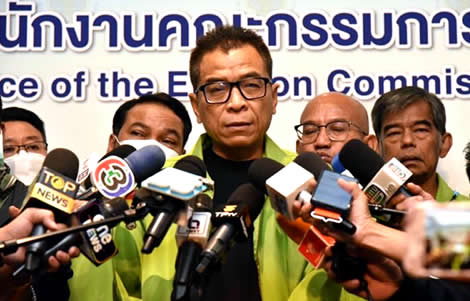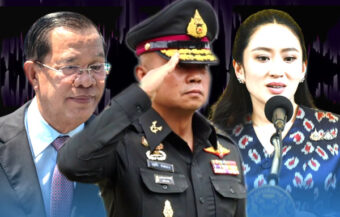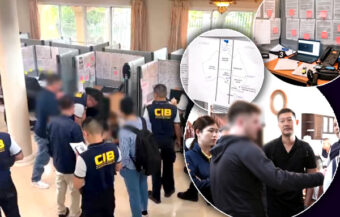Leading legal expert at Thammasat University rubbishes the case against the Prime Minister-elect Pita Limjaroenrat based on case law precedent and Thailand’s civil code relating to property and wills. The probe, ordered on Friday, will prolong the ongoing political uncertainty cased by May’s shock election result.
The impending political instability that threatens Thailand in August may have been eased by a decision on Friday by the Election Commission to dismiss three complaints before it against Mr Pita Limjaroenrat, the Move Forward Party leader and prospective Prime Minister-elect based on the May 14th General Election result but it has set the scene for a renewed national conflict in the near term for the government that may emerge in August between entrenched establishment and pro-democratic forces in Thailand.

A decision to investigate the main candidate for Prime Minister in August following the May 14th General Election, Mr Pita Limjaroenrat, by the Election Commission will have implications for what appears to be a showdown between the forces of conservatism in Thailand and nearly 75% of voters who plumped for the eight party coalition that is supporting his bid to be elected to the post in parliament.
On the one hand, the decision to dismiss the complaints against Mr Pita regarding shares in the defunct TV station iTV, as out of date, clears the way for his nomination as Prime Minister, but the decision by the body to investigate a possible offence under Section 151 of the Electoral Act will, in the short term, stir rising opposition to his election by the combined National Assembly from within the Senate while presenting any new government with a number of legal challenges that may ultimately end up before the Constitutional Court.
Unanimous decision on Friday may allow a new government to come to power in August but expedited a future political crisis by ordering a criminal probe
The Election Commission ruled, on Friday, in a unanimous decision to dismiss three complaints in relation to the media shareholding in the defunct iTV firm reportedly held by the Move Forward Party leader as part of his duties as the executor of his father’s estate.
The six commissioners ruled, on a technicality, that the dates the submissions were made were outside the limited time frame allowed by the law for objections to a candidate in the May 14th General Election.
However, most significantly, the commission ruled that there was evidence at face value based on the details submitted to suggest that Mr Pita, who is tipped to become Thailand’s next Prime Minister in August, had committed a criminal offence under Sections 42(3) and 151 of the 2018 Organic Act on the Election of Members of the House of Representatives.
Friday’s decision initiated a criminal probe into Mr Pita and placed a Sword of Damocles over his political future leaving Thai politics in suspense
The electoral body has now made a relatively quick decision to order an investigation of Mr Pita by an official of the Office of the Election Commission, the results of which will be presented for consideration by it and possibly be referred to the Constitutional Court in due course.
The Election Commission is looking into whether Mr Pita knowingly put himself forward as a party list candidate for MP when he was aware that he was disqualified from doing so under Section 151 of the law on the basis that he was prohibited as the owner of shares in a mass a media firm as specified in Section 42(3).
The decision places a Sword of Damocles over Mr Pita who is now free to take his position as a party list MP but finds himself the subject of a criminal probe by the Election Commission which could see him jailed for up to twenty years with the law specifying a term of up to ten years.
The court may double this penalty because of the offender’s status as an office holder if the office was deemed an act of corruption.
In addition, the court can order the return of any emoluments paid to Mr Pita as an MP and suspend his rights to vote for twenty years.
Decision based on the 2018 law governing House of Representative elections passed by the junta regime
The law concerned is the 2018 Organic Law on Elections.
Section 42(3) specifies that any candidate for MP should not be the owner or shareholder of a newspaper or mass media business while Section 151 specifies the sanction to be applied against a person who knowingly breaches the law.
This is not an offence defined by strict liability.
The law was enacted by the National Council for Peace and Order (NCPO), the former military junta and confirmed by its rubber stamp and unelected parliament, the National Legislative Assembly and is not part of the Criminal Code.
‘It’s the Office of the Election Commission’s job to gather information and submit it to the Election Commission to decide if he has violated Section 151 by applying to contest the election despite having been fully aware he probably wasn’t eligible to,’ said Mr Sawaeng Boonme, the Secretary-general of the Election Commission on Friday after the announcement. ‘The Election Commission can’t consider Mr Pita’s status as an MP because he isn’t an MP yet. If he is endorsed and the Election Commission has questions about his qualifications, it can ask the Constitutional Court to rule,’ Mr Sawaeng further outlined.
Immediate impact is to clear the way to electing Mr Pita as Prime Minister in August by parliament
The immediate impact of this decision is that it does clear the way somewhat for the endorsement of MPs by the Election Commission before July 13th next including Mr Pita.
Dangerous political flux in the aftermath of the General Election is growing and poses a threat
Pita shares cast a pall over historic May 14th Election, fears that the results may be nullified by a court
The current eight-party coalition behind Mr Pita Limjaroenrat controls 313 MPs in parliament and there are indications that there will be some support from the Democrat Party and a growing number of senators as Mr Pita’s candidacy seeks 376 votes which under the constitution he must reach to be able to form a government.
However, after that, the danger to his position, even if elevated to the office of Prime Minister, will remain despite claims this week by Move Forward Party supporters and heavyweights such as Mr Rangsiman Rome that the shareholding issue is a blatant attempt at political bullying and would essentially deny the will of the people to form the government it voted for in the May 14th poll.
Leading Thammasat University academic rubbishes the basis for such legal action against Mr Pita based on case law and Thailand’s existing civil code
In recent days, a leading academic Mr Prinya Tewanarumitkul, the director of the jurisprudence centre at Thammasat University, has claimed there is no merit in the case against Mr Pita over the iTV shares held as part of the dealings concerned with the will of his late father.
Mr Prinya said that the shareholding in question was just 0.00035% of the shares and that case precedent in Thailand as well as the Civil and Criminal Code held that such shares were not the property of anyone while held in probate until they were legally distributed and assigned to the heirs in final settlement.
He said that the renunciation of the shares this week by Mr Pita legally is backdated to the death of the owner of the legal estate and he has therefore never been an owner of the shares in question.
Mr Prinya also dismissed a complaint filed against the Move Forward Party over a cartoon comic strip which had images of a hammer and sickle.
Cartoon complaint to the Election Commission
He said that the cartoon had no direct link to the political party and that, in any event, such images did not represent communism and could not be construed as a commentary or rejection of Thailand’s constitution or an illegal act requiring action by the Election Commission.
Mr Prinya called on the commission to focus on clarifying the election results quickly in order to let the country advance.
‘In the case of the Progressive Party, it is not the party’s logo. Just one of the pictures on the poster. The Election Commission should not infer that Hammer and Sickle cartoons are going to overthrow democracy. By law, there must be an act to overthrow the government. I saw this. The Election Commission should dismiss the petition. Then hurry up and do its duty, which is to announce the certification of MPs. The country can then move forward,’ said Prinya.
In the meantime, the Election Commission has announced a new tallying of votes at 47 count centres across 16 provinces where it was found that the number of votes cast did not match the number of people who voted.
Recount ordered in 16 provinces with 20 MPs being examined after complaints were filed against them will not impact election outcome says Commission
The official agency has indicated that it will not materially affect the election outcome but it will see a recalculation of party-list votes.
The commission is still examining the election of 20 MPs against whom complaints have been lodged across the country with the eight-party coalition this week saying that this matter will also have no bearing on its ability to form Thailand’s next government and elect 43-year-old Mr Pita Limjaroenrat as Thailand’s 30th Prime Minister, the youngest person to hold the position in 78 years
Between the 1st of August 1944 and the 24th of March 1946, in the turmoil following the defeat of Japan and the defeat of its forces in Thailand and in an era just before the end and the aftermath of the World War Two conflict, Thailand had three young prime ministers Mr Khuang Aphaiwong, Thawi Bunyaket and Seni Pramoj.
All were younger than Mr Pita and operated in a power vacuum created by the end of the war, just two years before the restoration of former dictator, General Plaek Phibunsongkhram, who returned to power as a civilian democratic prime minister in 1948 after a coup in 1947.
Join the Thai News forum, follow Thai Examiner on Facebook here
Receive all our stories as they come out on Telegram here
Follow Thai Examiner here
Further reading:
Dangerous political flux in the aftermath of the General Election is growing and poses a threat
Compromise mooted between Pheu Thai and Move Forward on House Speaker job before key meeting
Kooky Palang Pracharat reports rejected on Tuesday by Prawit as Pheu Thai stands by Pita for PM
Move Forward’s ‘Government of Hope’ coalition delivers a programme promising a new charter
Jatuporn warns Pheu Thai may be turned as he predicts a political impasse. Should wait for 2024
Election vote for Move Forward may have been a cry for help from voters mired in short-term debt
Pita, Move Forward and eight other parties meet in Bangkok and come out smiling, ready to govern
Move Forward Party’s good election result leaves uncertainty as to who will form the government
Move Forward leader denies claims he held shares in media company barring him as a Bangkok MP
Move Forward Party surging in the polls as the General Election campaign enters its final week
PM warns giveaway policies of some parties may be ‘bad karma’ for the country in the longer run
Leader of PM’s UTN tells rally a government led by his party will ‘get tough’ with nation haters


















